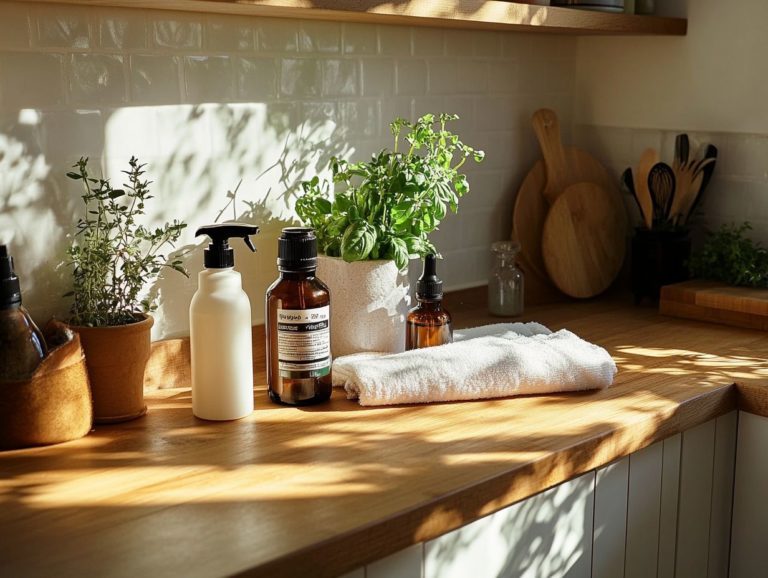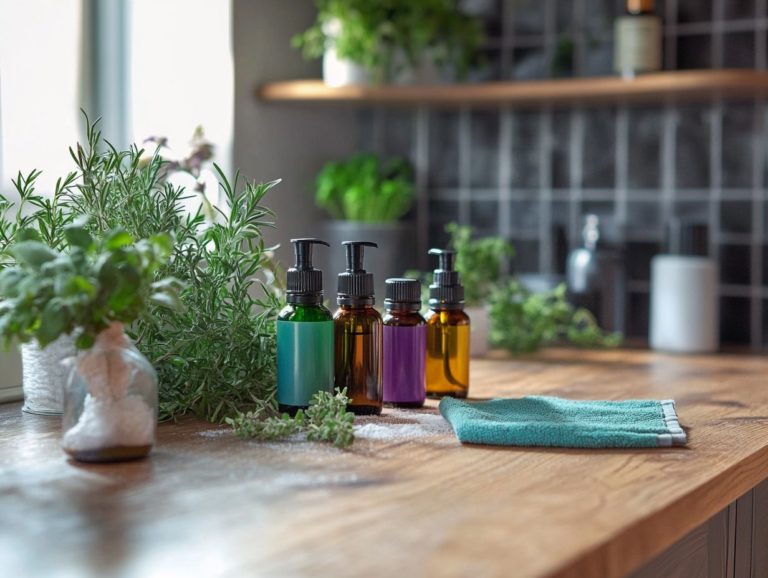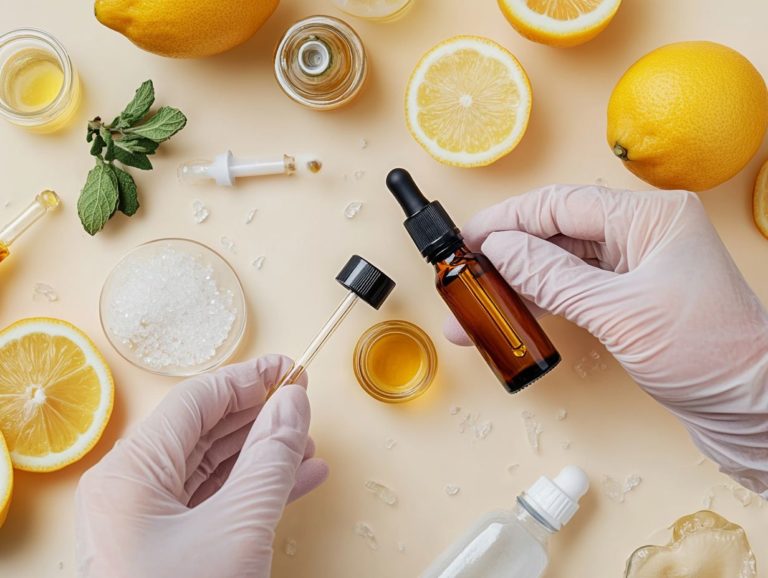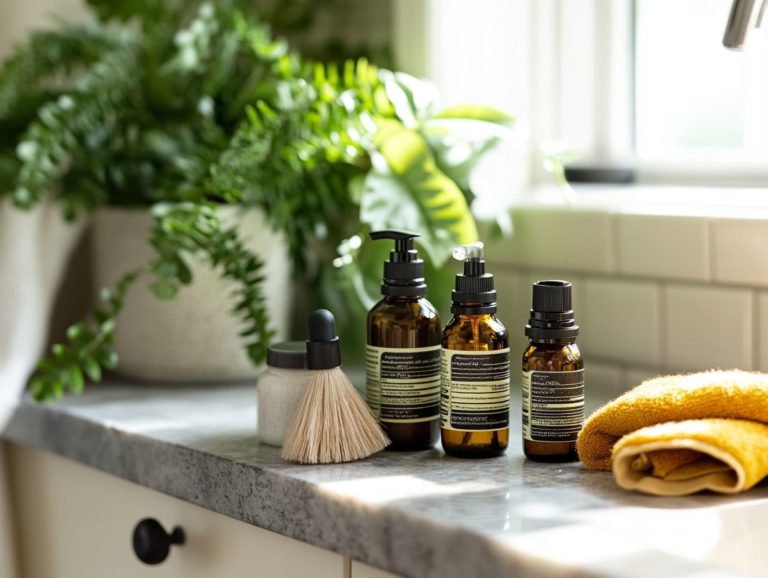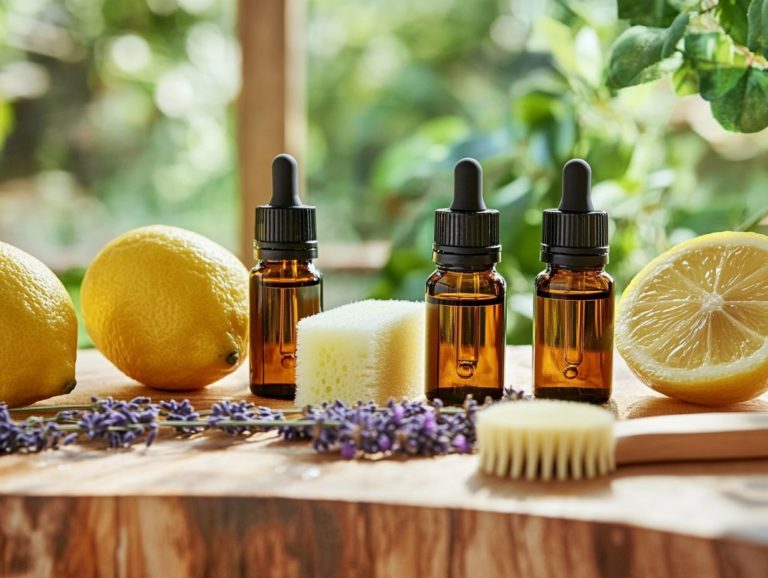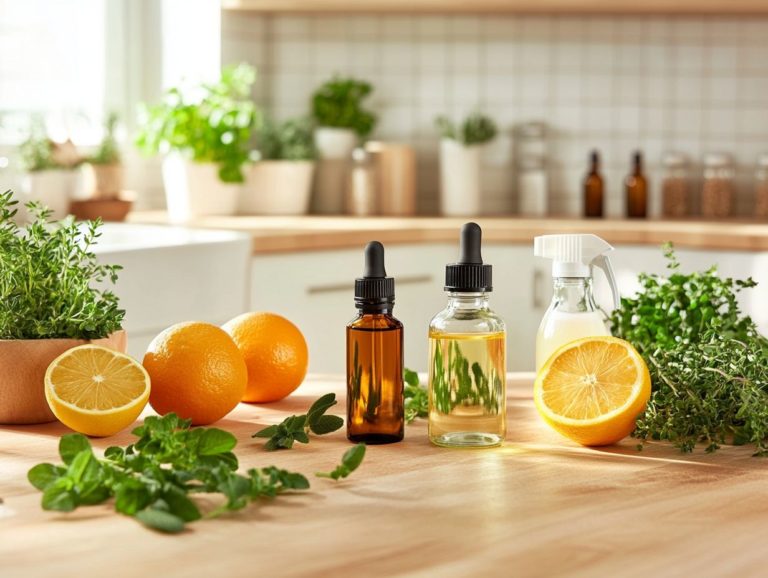Essential Oils for Cleaning: A Beginner’s Toolkit
Essential oils have become a favorite not only for their enchanting scents but also for their remarkable cleaning abilities, making them an integral part of any spring cleaning arsenal.
In this exploration of essential oils, you’ll uncover their many benefits for cleaning. You will discover the various types that can be utilized and learn how they work to maintain a fresh and safe environment in your home.
You will find valuable insights on safety precautions, pet considerations, and essential supplies like vinegar, water, liquid Castile soap, and baking soda. These are all you need to embark on this cleaning journey.
You will also find practical recipes for homemade cleaning solutions and alternative cleaning methods, including disinfectant sprays and all-purpose cleaners, that can elevate your home care routine to a whole new level!
Contents
- Key Takeaways:
- What Are Essential Oils?
- How Do Essential Oils Work For Cleaning?
- What Are The Safety Precautions When Using Essential Oils For Cleaning?
- What Are The Basic Supplies Needed For Cleaning With Essential Oils?
- How To Use Essential Oils For Cleaning?
- How To Store Essential Oils For Cleaning?
- What Are The Alternatives To Essential Oils For Cleaning?
- Frequently Asked Questions
- What are essential oils?
- What are the benefits of using essential oils for cleaning?
- Which essential oils are best for cleaning?
- How do I use essential oils for cleaning?
- Are there any safety precautions I should take when using essential oils for cleaning?
- Can I mix different essential oils together for cleaning?
Key Takeaways:
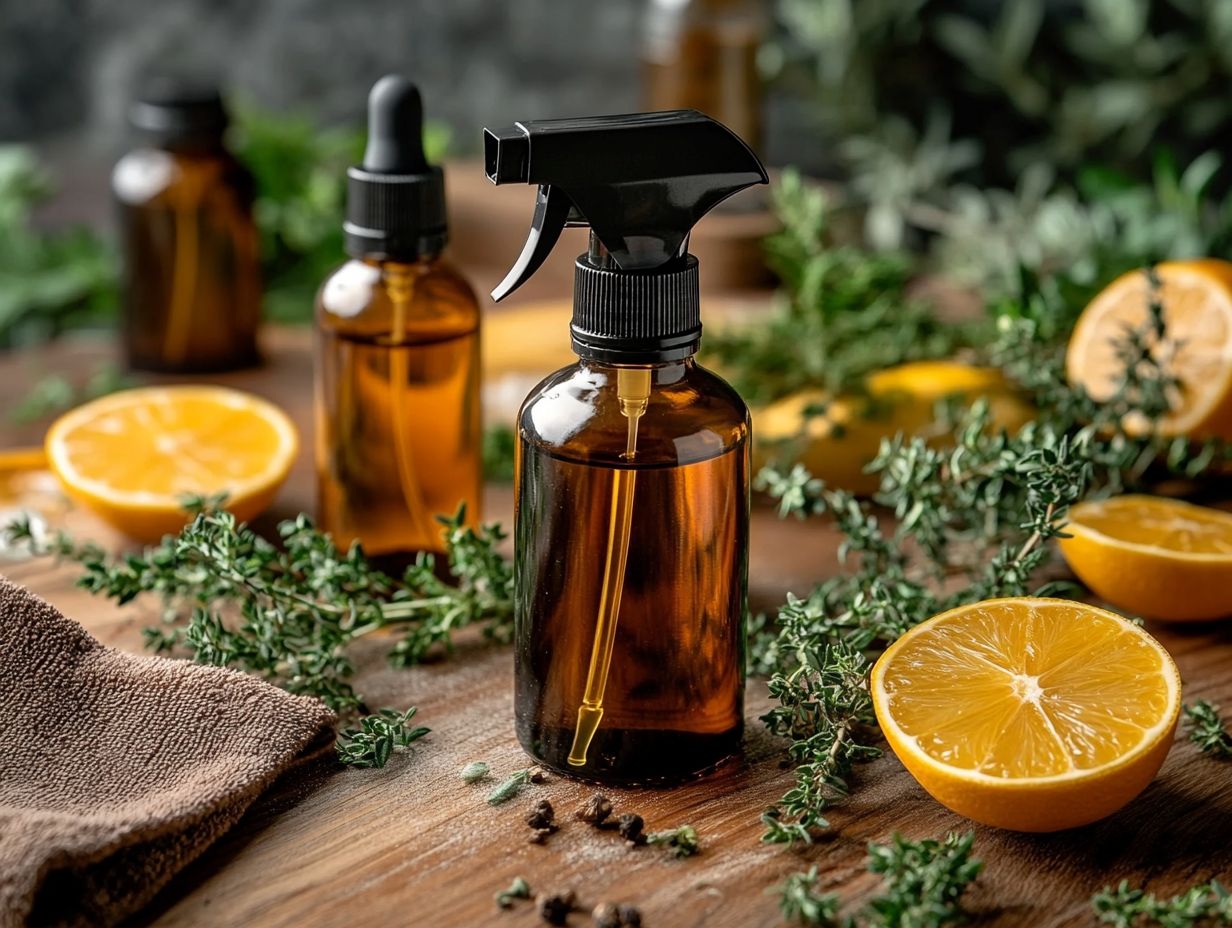
- Essential oils have various benefits for cleaning, such as being natural, non-toxic, and effective against bacteria and viruses, making them excellent disinfectants.
- Different types of essential oils have different cleaning properties, making them versatile for different cleaning tasks, from glass cleaners to carpet deodorizers.
- Safety precautions must be taken when using essential oils for cleaning, including proper dilution and keeping them away from pets, especially when dealing with Citrus Oils.
What Are Essential Oils?
Essential oils are potent plant extracts that pack a powerful punch for your cleaning routine. They present an array of benefits that span natural remedies, aromatherapy, and effective cleaning solutions. Their rise in popularity can be attributed to their non-toxic cleaning properties and their ability to refresh your home.
Consider the delightful nuances of Lemon Essential Oil, the purifying nature of Tea Tree Oil, and the calming aroma of Lavender Essential Oil; each offers distinct scents and advantages. These oils are essential for cultivating a healthier home, particularly for those who are mindful of environmental concerns and seasonal threats.
What Are The Benefits Of Using Essential Oils For Cleaning?
Using essential oils for cleaning offers many benefits. They fill your home with fresh, uplifting scents while promoting a healthier environment.
These natural disinfectants are not only effective but also non-toxic and eco-friendly. Harnessing the power of plants, essential oils possess remarkable germ-fighting abilities that effectively combat bacteria and viruses, all without the harsh chemicals typically found in conventional cleaners.
For those who are health-conscious or suffer from allergies, choosing essential oils can significantly minimize exposure to harmful substances, leading to improved indoor air quality.
Incorporating these oils into your cleaning regimen aligns beautifully with an eco-friendly lifestyle, as many come from sustainable sources. By swapping out traditional cleaners for essential oil alternatives, you not only embrace safer, more holistic solutions but also play a part in preserving the environment.
How Do Essential Oils Work For Cleaning?
Essential oils serve as powerful allies in your cleaning routine, leveraging their natural antibacterial properties to effectively combat dirt, grime, and germs in any space.
When you incorporate these oils into your homemade cleaning recipes, they elevate the cleaning process while promoting a healthier home environment by minimizing your dependence on harsh, chemical-laden products. A simple mixture of vinegar and water combined with essential oils can serve as an effective all-purpose cleaner.
By blending essential oils into your DIY cleaning solutions, you can craft effective disinfectants and all-purpose cleaners while infusing your surroundings with delightful, refreshing scents.
What Are The Different Types Of Essential Oils Used For Cleaning?
Various essential oils can elevate your cleaning routine, each bringing its own distinct benefits. Here are some of the most effective:
- Lemon Essential Oil offers a refreshing scent paired with impressive grease-cutting abilities.
- Tea Tree Oil is renowned for its antifungal and antibacterial properties, making it a staple in any effective cleaning arsenal.
- Lavender Essential Oil adds a soothing fragrance that transforms the mundane task of cleaning into a more pleasant experience. Eucalyptus Essential Oil is your go-to for repelling pesky insects.
- Don’t overlook Peppermint Essential Oil. Its invigorating aroma not only keeps your spaces feeling fresh but also serves as a natural insect repellent, ensuring you enjoy your surroundings without unwanted guests.
- Orange Essential Oil delivers a delightful, uplifting scent and boasts powerful degreasing properties, making it an excellent choice for kitchen surfaces.
- Geranium Essential Oil elevates the atmosphere with its calming effects while effectively tackling odors. It can also be combined with other oils to create powerful oil combinations for various cleaning needs.
By combining these oils in your homemade cleaning products, you can enhance their effectiveness and aromatic charm. Create a safer and more enjoyable alternative to commercial cleaners.
What Are The Safety Precautions When Using Essential Oils For Cleaning?
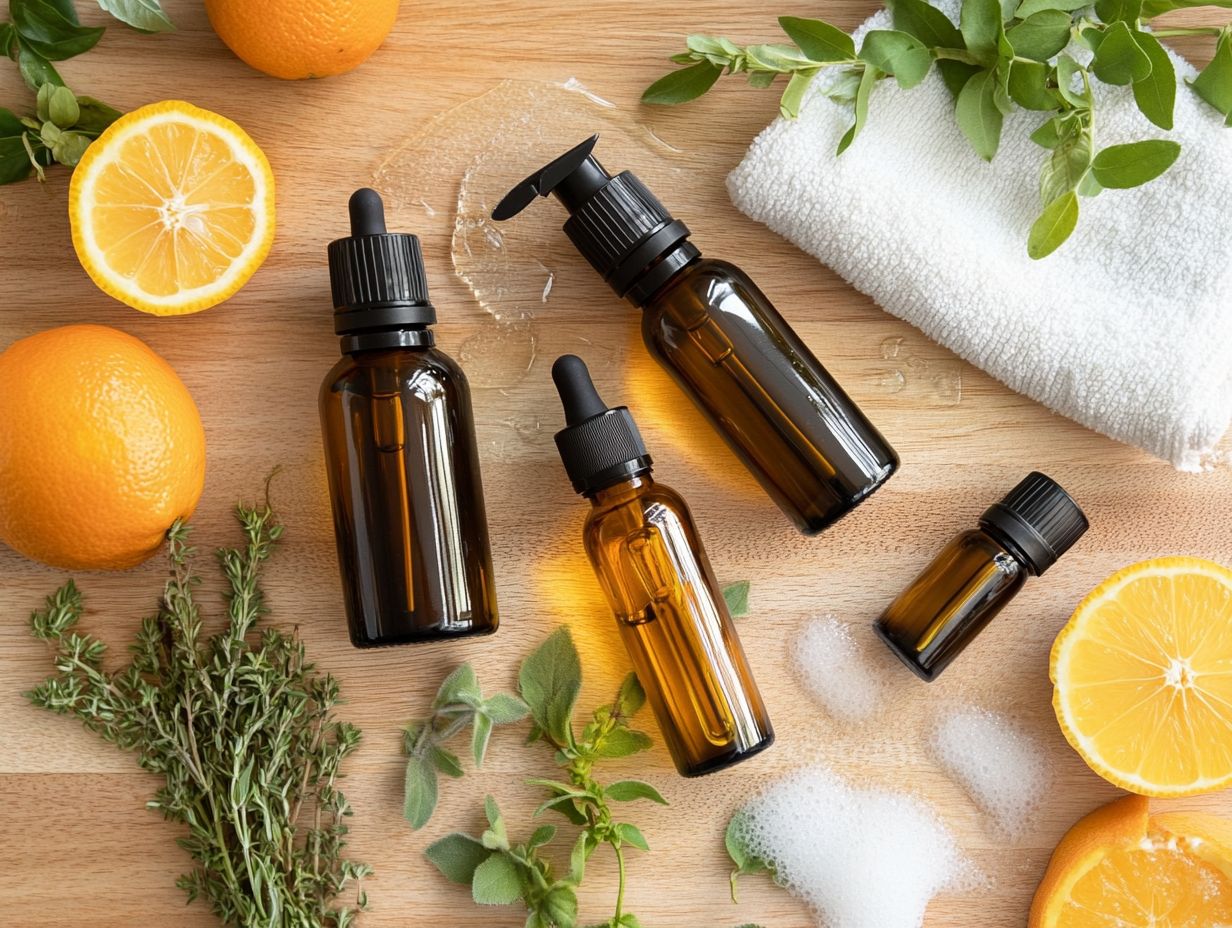
When using essential oils for cleaning, it s vital to take safety precautions to protect yourself and your pets! Here are key points to consider:
- Ensure proper dilution, which means mixing essential oils with a carrier oil to reduce their strength.
- Steer clear of sensitive areas.
- Be aware of the potential health risks linked to certain oils especially for vulnerable groups like children and pets.
For example, the On Guard blend from doTERRA is popular but comes with specific usage instructions to ensure safety.
Follow these safe practices to enjoy the many benefits of non-toxic cleaning while prioritizing your health and that of your loved ones. Act now to keep your home safe and clean for your family and pets!
Are Essential Oils Safe For Pets?
While many essential oils can be safely used for cleaning around pets, it s essential to proceed with caution. Some oils may pose health risks to your furry friends. As a pet owner, you need to know which essential oils could be toxic, ensuring that your cleaning practices create a safe environment while still being effective.
Avoid using oils like Cinnamon, Clove, and Citrus, as these can cause gastrointestinal upset or skin irritations in pets. On the flip side, oils like Lavender and Chamomile are generally considered safe and can even offer calming effects for both dogs and cats, much like aromatherapy does for humans.
When selecting cleaning products, always opt for specially formulated non-toxic alternatives that use pet-safe ingredients. It s also a smart move to consult with a veterinarian for tailored recommendations. This way, your cleaning routine not only keeps your home fresh but also prioritizes the health and well-being of every member of your household.
Start using essential oils today to elevate your cleaning routine safely and effectively!
What Are The Risks Of Using Essential Oils For Cleaning?
Using essential oils for cleaning can come with certain health risks, including potential allergic reactions and respiratory issues, particularly for sensitive individuals.
While these oils are often celebrated as natural alternatives to conventional cleaning products, it s crucial to understand that strong oils can cause bad reactions if not handled with care.
Though you may be attracted to the uplifting scents and touted health benefits of essential oils, it s essential to know how to use them safely. For instance, if you have asthma, allergies, or chemical sensitivities, you might be more susceptible to the effects of certain oils, which could result in symptoms like breathing difficulties or skin irritations.
Given the lack of regulatory oversight in the essential oil industry, product purity and formulation can vary significantly. Therefore, if you re considering incorporating essential oils into your cleaning routine, it s wise to conduct thorough research, perform patch tests (a way to check if your skin reacts badly to a product), and consult with healthcare professionals to minimize any unwanted reactions and ensure a safe cleaning environment.
Brands like Simply Earth are known to publicly share their testing results, which can provide additional peace of mind.
What Are The Basic Supplies Needed For Cleaning With Essential Oils?
Your essential supplies will include high-quality essential oils from reputable brands like doTERRA or Simply Earth, and versatile agents such as Castile soap, vinegar, and baking soda.
To effectively clean with essential oils, gather supplies that elevate your cleaning game. Start with high-quality essential oils, preferably from well-known brands like doTERRA or Simply Earth, as they are the heart of your natural cleaning arsenal.
Pair those with versatile agents like Castile soap, vinegar, and baking soda, which are fantastic for tackling various surfaces. Don’t forget to include microfiber towels they’re key to achieving optimal effectiveness.
Consider a simple mixture of vinegar and water for an all-purpose cleaner that is both effective and non-toxic. With these carefully chosen supplies, you can craft a range of non-toxic cleaning products tailored perfectly to your unique cleaning needs.
What Are The Recommended Essential Oils For Cleaning?
For effective cleaning, you ll want to reach for some essential oils that are truly game-changers. Lemon Essential Oil is a must-have, with its refreshing scent and impressive grease-cutting abilities.
Then there’s Tea Tree Oil, renowned for its potent antibacterial properties, and Lavender Essential Oil, which brings a calming aroma that elevates any cleaning routine to a new level of serenity. Eucalyptus Essential Oil is also great for creating your own disinfectant spray.
Consider adding Peppermint Essential Oil to your cleaning supplies. It not only infuses your space with a delightful minty freshness but also doubles as a natural pest repellent, making it perfect for kitchens.
Eucalyptus Essential Oil deserves a spot on your shelf as well, thanks to its invigorating scent and decongestant qualities that effectively disinfect surfaces. Also, don’t forget about doTERRA’s On Guard blend, which is specifically designed to enhance cleaning efficiency.
Let s not overlook Orange Essential Oil, celebrated for its mood-boosting effects and knack for breaking down stubborn grime. When you incorporate these oils into your cleaning regimen, think about mixing them with natural ingredients like vinegar or baking soda for an extra punch in cleaning effectiveness. Consider adding Castile soap for an even more powerful cleaning mix.
How To Use Essential Oils For Cleaning?
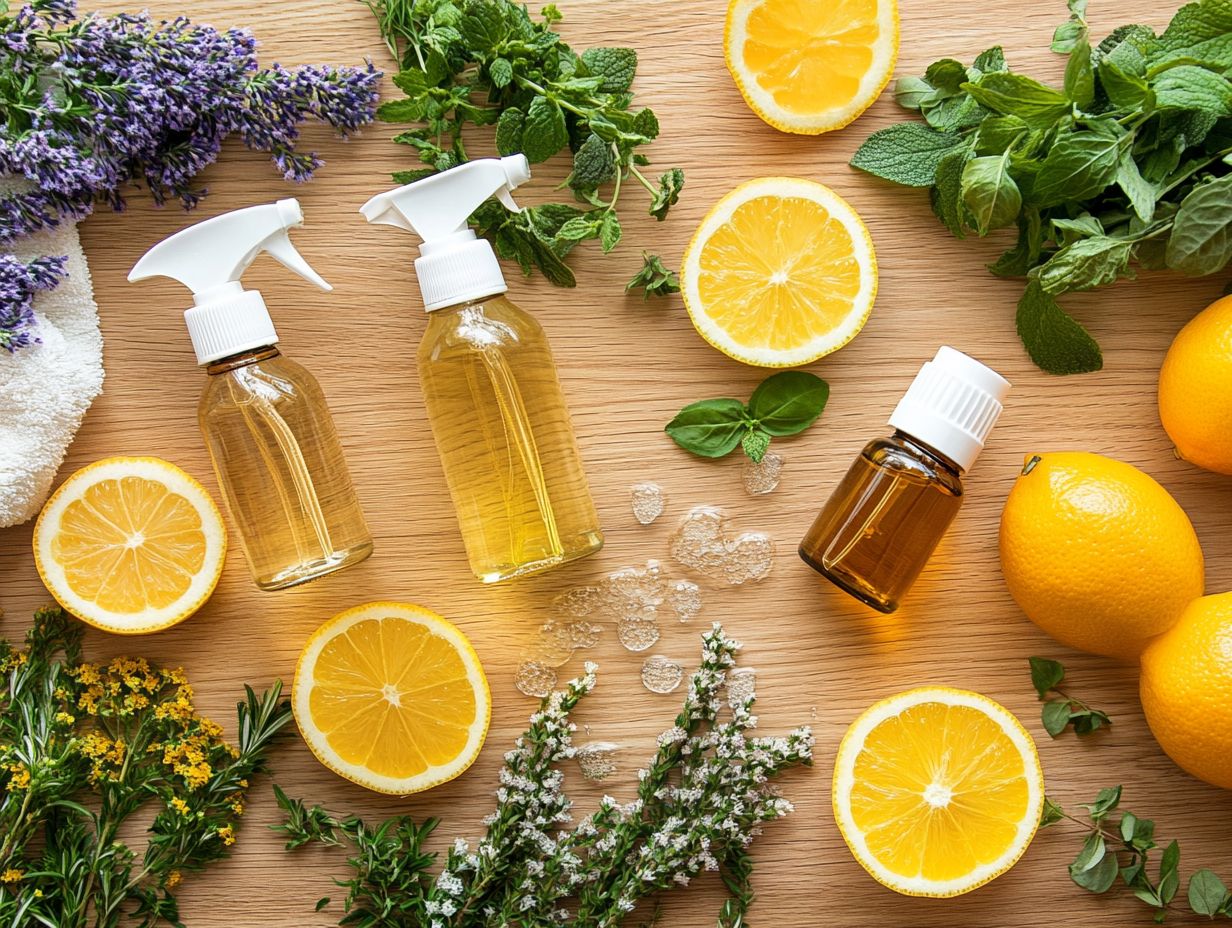
Integrating essential oils into your cleaning routine can be both practical and beneficial. Many DIY cleaning methods leverage these oils for their powerful disinfectant properties.
Using essential oils for cleaning opens the door to simple yet highly effective methods that can elevate your cleaning routine. By integrating these aromatic oils into your DIY cleaning recipes like an all-purpose cleaner or a disinfectant spray you can tap into their natural cleansing properties while infusing your environment with delightful fragrances.
These oils not only clean but also make your space smell amazing! It s a refreshing way to transform ordinary chores into a sensory experience, with the added benefits of aromatherapy.
Grab your essential oils today and start creating a cleaner, healthier home!
What Are The Different Cleaning Recipes Using Essential Oils?
You have a wealth of cleaning recipes at your fingertips that utilize essential oils. This includes an all-purpose cleaner that beautifully blends vinegar and water with Lemon Essential Oil, a disinfectant spray that kills germs and bacteria powered by Tea Tree Oil, and a refreshing carpet deodorizer crafted from baking soda and Lavender Essential Oil. Don t forget to include Eucalyptus Essential Oil for an added boost.
These homemade cleaners harness the strength of natural ingredients while filling your home with delightful scents! For example, the all-purpose cleaner is perfect for tackling grime on countertops, while the Tea Tree Oil disinfectant spray excels at sanitizing bathroom surfaces and doorknobs, creating a germ-free environment.
The carpet deodorizer does more than just eliminate unwanted odors; it also helps absorb daily dust and pet dander, promoting a fresher home. Start using these simple yet effective recipes today to maintain a clean and inviting atmosphere while reaping the therapeutic benefits of essential oils. Brands like doTERRA and Simply Earth offer high-quality oils ideal for these purposes.
How To Store Essential Oils For Cleaning?
Proper storage of essential oils is essential for maintaining their effectiveness and extending their shelf life. You should keep these precious oils in airtight containers, ideally dark glass bottles that provide UV protection, and store them in a cool, dry place away from direct sunlight. This way, their cleaning effectiveness remains intact. Brands like doTERRA s On Guard and Simply Earth offer oils in suitable packaging for long-term storage.
The choice of container is crucial for keeping the oils effective, as plastic can leach harmful chemicals over time. It’s also wise to label your bottles with the date of purchase and expiry, helping you keep track of freshness and reminding you to use them within their optimal period.
Maintaining a consistent temperature is vital, as fluctuations can lead to degradation. Consider designating a special shelf or drawer for your essential oils, protecting these valuable substances from moisture and heat sources. This approach ensures they remain as effective as possible for all your various applications, including aromatherapy and natural remedies.
What Are The Alternatives To Essential Oils For Cleaning?
Essential oils present a delightful and natural cleaning alternative, but you have a wealth of other effective options at your disposal. In Wisconsin, essential oils are increasingly popular as non-toxic cleaning agents. For instance, Citrus Oils can provide fresh scents and additional cleaning power.
Consider non-toxic cleaning agents like vinegar and baking soda, which serve as popular substitutes that can be used alone or combined with essential oils to boost your cleaning power. These agents are also effective in addressing environmental issues. Microfiber towels are also an excellent tool to use in conjunction with these agents for thorough cleaning.
For those who prefer convenience, commercial cleaners stand ready, offering quick and effective solutions for your cleaning needs. However, it’s crucial to be mindful of environmental issues associated with chemical-based cleaners and opt for eco-friendly choices wherever possible.
Frequently Asked Questions
What are essential oils?
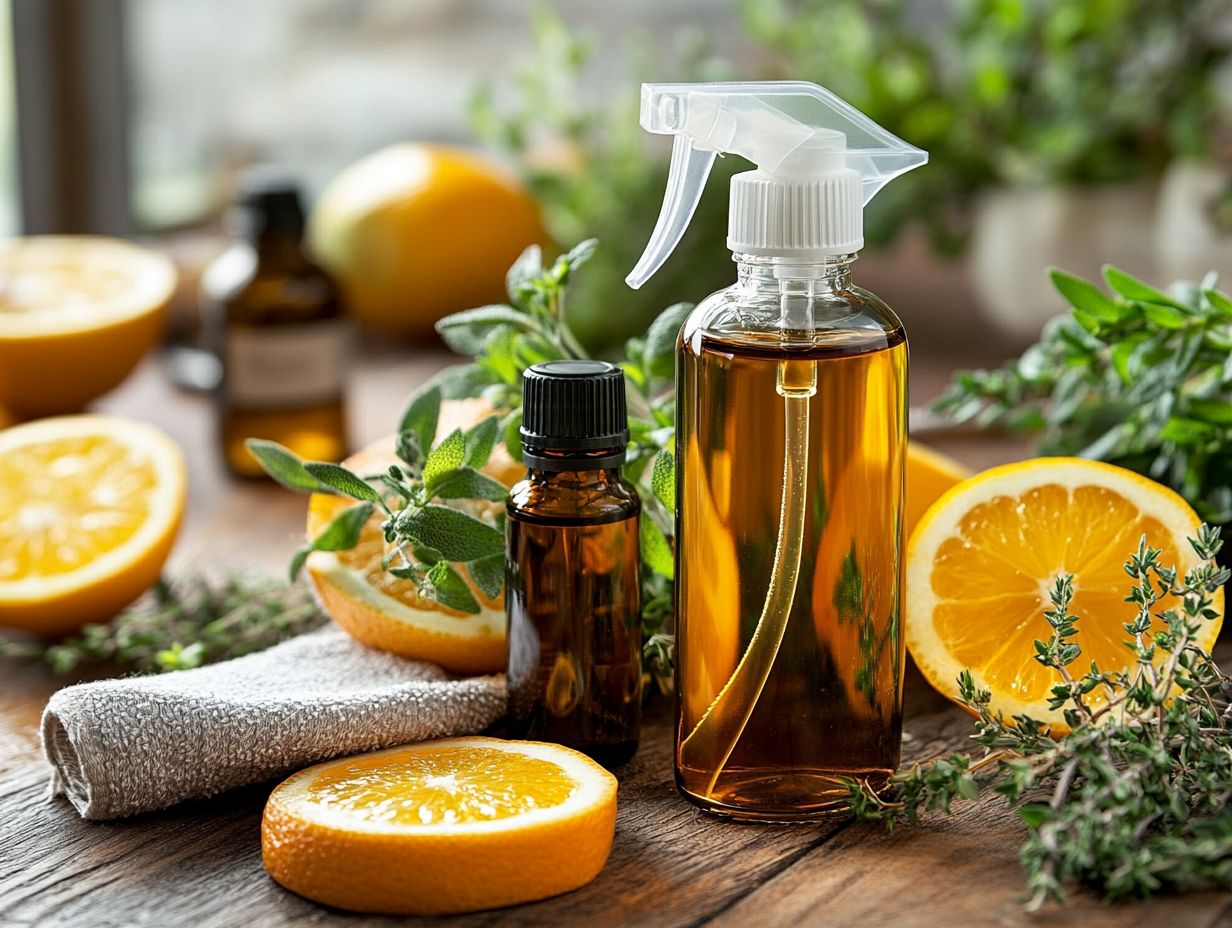
Essential oils are natural plant extracts that are highly concentrated and potent. They are typically obtained through steam distillation or cold pressing and have various therapeutic properties. These oils are widely used in aromatherapy and natural remedies.
What are the benefits of using essential oils for cleaning?
Essential oils have natural antibacterial, antiviral, and antifungal properties that make them effective for cleaning and disinfecting. They are also non-toxic and chemical-free, making them safe for use around children and pets. They also provide therapeutic benefits that reduce stress and enhance mood.
Which essential oils are best for cleaning?
Some of the best essential oils for cleaning are lemon essential oil, tea tree oil, eucalyptus essential oil, peppermint, lavender essential oil, and orange. These oils disinfect effectively. They also add a fresh scent to your home. They work best when combined with natural remedies like baking soda and vinegar.
How do I use essential oils for cleaning?
Essential oils can be used in various ways for cleaning. You can add a few drops to your homemade cleaning solutions. Use them in a diffuser for a natural air freshener. Or, mix them with water and vinegar for a powerful all-purpose cleaner.
Are there any safety precautions I should take when using essential oils for cleaning?
Always use essential oils safely, especially around children and pets. Your safety matters! While these oils are natural, they are still highly concentrated and can cause skin irritation or allergic reactions if used improperly.
Make sure to dilute them properly and avoid direct contact with skin. Keep them out of reach of children and pets. It’s also important to be aware of any seasonal threats that might affect the potency of the oils.
Can I mix different essential oils together for cleaning?
Mixing oils isn t just allowed; it can supercharge your cleaning routine! Yes, you can mix different essential oils together for cleaning. Combining different oils can create a more potent and effective cleaning solution. For instance, blending lemon and eucalyptus oils can enhance their disinfecting power. Just make sure to do your research on the properties of each oil before mixing to ensure they are safe to use together.

